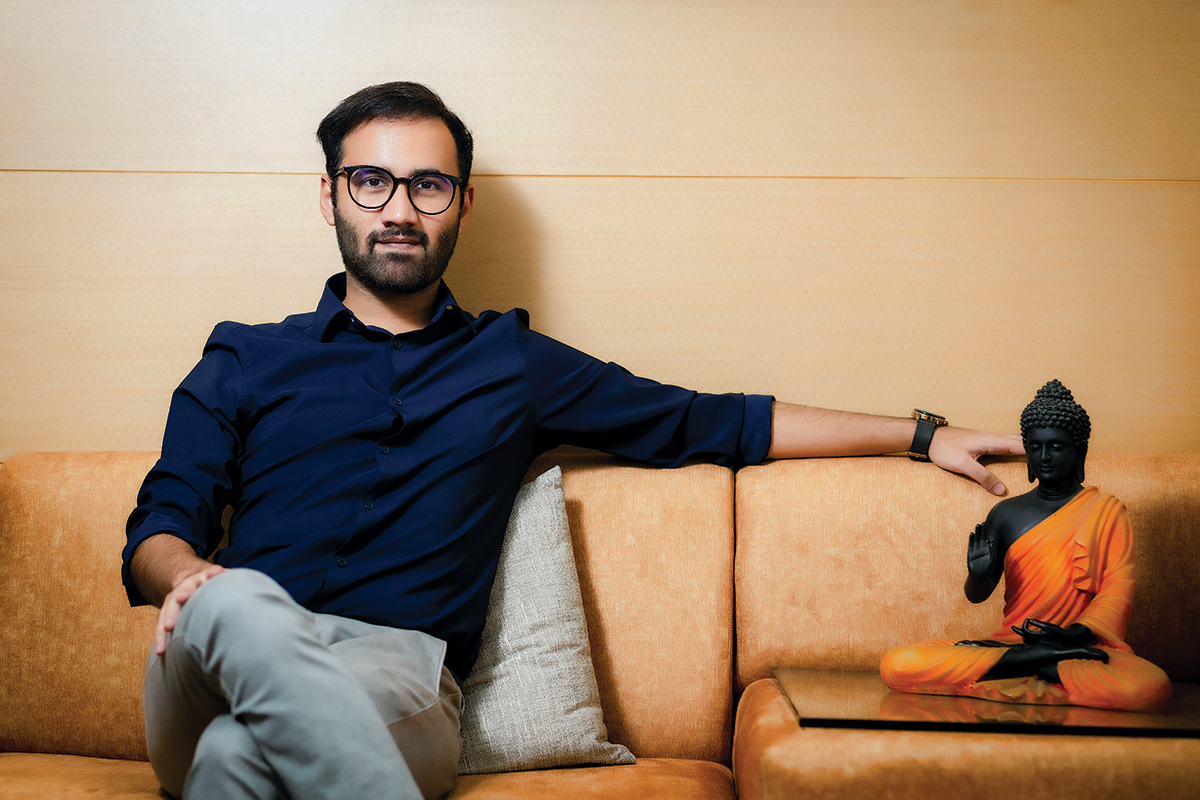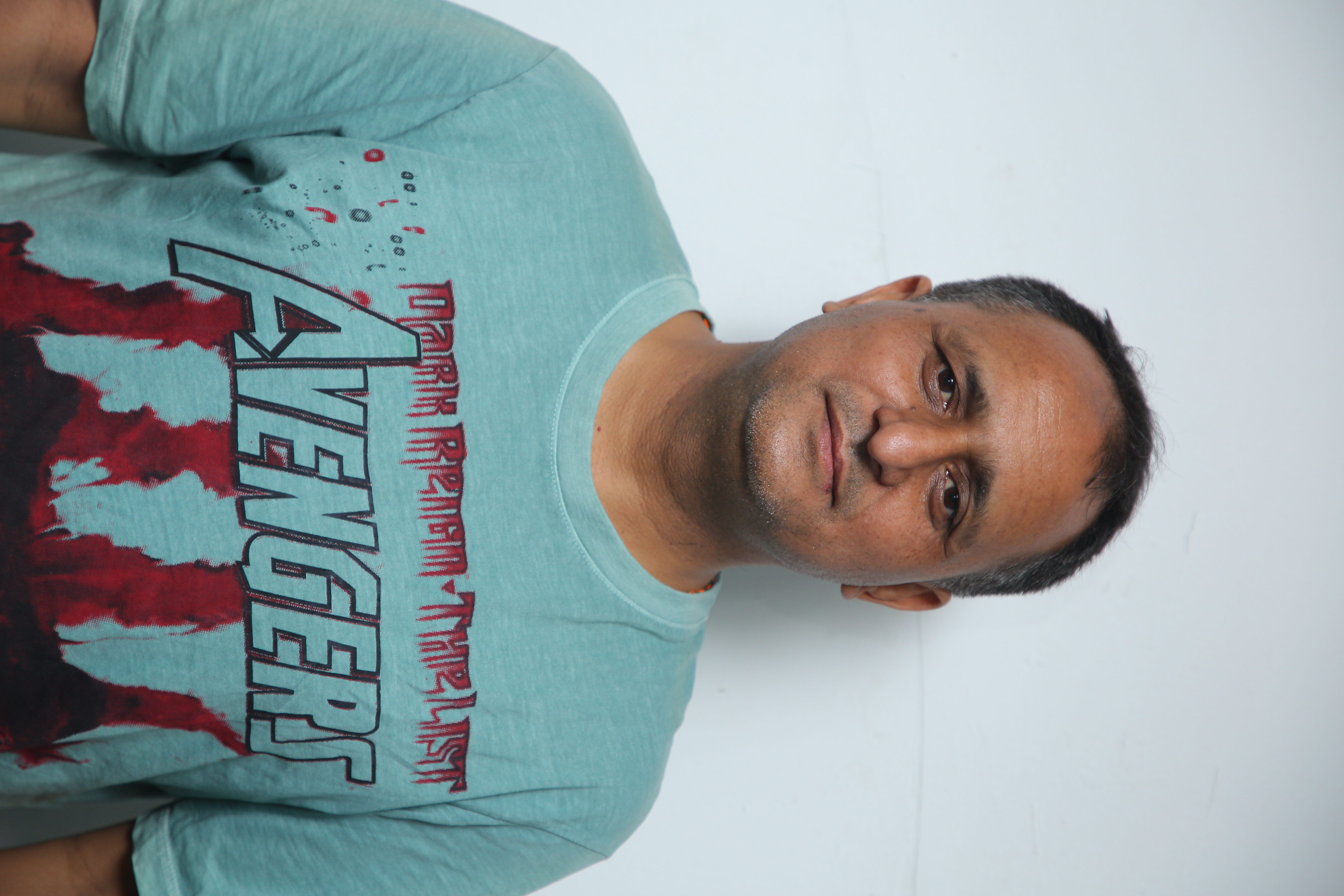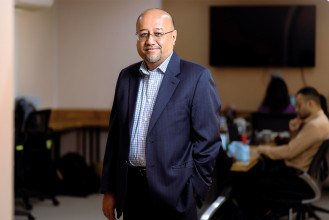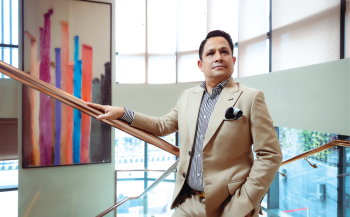
Aditya Dugar, Director, Century Group of Companies, is the third generation of his family to lead the business. As an only son, it was inevitable that he would follow in his father’s footsteps. After completing his Bachelor’s degree in Accounting, Finance and Commerce in Australia, Dugar returned to Nepal and interned for a short stint at Sunrise Bank. He then pursued a Master’s degree at Brunel University in London but the pandemic forced him to return home early and complete the course online. The challenges posed by Covid 19 were manifold when Dugar joined the family business; a period that tested most businesses. He has since spent nearly five years managing its operations.
Aditya acknowledges both the privileges and challenges of inheriting a well-established business. While he appreciates the foundation his father, Moti Lal Dugar, laid, he also recognises the pressure to live up to his legacy.
To navigate the complexities of the business, Dugar made a conscious decision to shadow his father for the initial years. This allowed him to gain valuable insights into the industry and learn from his father’s experience. Aditya’s education abroad provided him with a broad perspective but he found that applying his theoretical knowledge to the practical realities of the family business required a different approach.
In a conversation with Business 360, Dugar talks about his experiences and his future goals for the company.
How did you get into the family business?
Being the only son, it was always clear that I would have to step into the family business. There wasn’t really another option, especially since my two elder sisters are married and living in India. After studying in Australia, where I completed my Bachelor’s in Accounting, Finance, and Commerce, I returned to Nepal and interned at Sunrise Bank in the Corporate Banking Department for four months. I was involved in the sanctioning and approval of loans, particularly large ones over 50 crores, where I had to prepare credit approval packages and attend consortium meetings.
After this internship, I pursued my Master’s at Brunel University in London. It was a one-year programme, but six months in, Covid 19 hit, and I had to return to Nepal, finishing the remaining classes online. Despite the pandemic, we had to keep our food-related business running. So, after completing my studies, I joined the family business full-time, and it’s now been almost five years that I have been managing the operations.
What are the pros and cons of carrying forward a business legacy?
There are certainly pros and cons. From an outsider perspective, it may seem like there are only advantages, and no negatives. One major benefit is that I have inherited a well-established business. It’s often said that being born with a silver spoon is a privilege, and I do feel fortunate. However, it is important to understand that I did not choose to be born into this situation. It is something that was given to me. Unlike my father, who had to build everything from scratch, whether it was Century Masala, hotels, or other ventures like packaging, bikes, trading and hospitality, I walked into a ready-made business. This, in itself, presents a challenge. My father built everything step by step, whereas I had to start at the top, which can be overwhelming because of the complexity of the business model and operations. It is a lot to take in all at once. So, I made a conscious decision to shadow my father for the first two to three years, observing how he works without interfering in the day-to-day operations. I wanted to learn as much as I could because managing a family business is very different from what you learn in university. No formal education truly prepares you for it.
For instance, if you study to be a CA, doctor, or lawyer, the path is clear and written out. But family businesses are unique, and each one requires a different approach depending on the sector. While my education abroad gave me a broad perspective, applying that knowledge to our business was tricky.
Another challenge is societal pressure. My father has achieved so much, he has built a conglomerate worth Rs 500-600 crores, held influential roles in politics, and is very active in philanthropy, charity and social services. There is always the question of whether I can live up to that legacy. People ask, directly or indirectly, whether I can fill his shoes. It is not easy but I have full faith in my capabilities and the value I can add to the company. I know my strengths and weaknesses, and I am confident that I can make a meaningful contribution.
Are there any changes that you have initiated after joining the business?
We have made significant advancements in the company recently, particularly in the area of technology. In fact, we have seen a threefold growth in this domain. To give you a clear example, one of the key innovations we have introduced is Sales Force Automation (SFA). Let me explain it simply: previously, when our salespeople went to the market, they had to manually record everything in their diaries – orders, payments, stock levels, everything. Now, they no longer need to rely on diaries. We have installed an app that allows them to take orders, collect payments, generate bills and even take stock photos – all from their phones.
If they notice a new competitor in the market, they can instantly upload relevant data. This system has streamlined everything, making it easier for them and for us. With just one click, I can generate a market visit report and track exactly where a salesperson is on the map, down to the minute details of how much time they spend with a client, which products are being sold, and where we need to focus our efforts. We can even analyse sales data region-wise.
Currently, we have implemented this system in the Bagmati region but within the next six months, we plan to expand it across Nepal. This will simplify operations even further. Now, salespeople can manage everything on their phones; no more carrying around diaries, worrying about rain, or dealing with extreme heat. Everything is done digitally, from their phones.
My father has achieved so much, he has built a conglomerate worth Rs 500-600 crores, held influential roles in politics, and is very active in philanthropy, charity and social services. There is always the question of whether I can live up to that legacy.
What are the values that you adhere to when doing business?
My guiding principles, values, morals and ethics all come from my father. He always tells me that we are privileged – we can afford our basic needs, we have a house to live in, and that itself is a significant privilege. What I want to convey is that no matter how much you earn, no matter what social status or power you gain, it is crucial to stay grounded. You must always remain humble, no matter your success. It is essential to understand the value of money and know what you are earning so you can wisely manage your spending.
For instance, when I was in Australia, I worked as a waiter in an Indian restaurant. I served food, washed dishes and even cleaned toilets. I did all of it. At the time, people would ask me why I took on those jobs, given that I came from a good background and could afford more. But that experience was life-changing. I worked there for two years, and it taught me the value of money. It showed me how important it is to understand how hard money is earned and how to treat both money and your employees with respect.
-1730179547.jpg)
In addition to that, I worked as an umpire for a cricket organisation. Every Sunday, I hosted three matches as the umpire. I had to carry the kit, set up the field, oversee the games, and then pack everything up afterward. I remember earning $50 per match, making $150 a day. Those small earnings helped me cover my weekly expenses and I am proud of that because I could support myself.
That experience was a major achievement for me. As I have mentioned, staying grounded and humble is so important. You should never let arrogance or ego infiltrate your work ethic because it will hinder your success. I have seen many business owners, including some of my friends and competitors, change with time and money. But the lesson my father instilled in me is this: never let money, power or social influence change who you are.
Today, whether you compare us with Unilever, P&G, Kellogg’s or Nestle, our processes are just as rigorous. This high standard is our guiding force and we are committed to maintaining it. No one, whether it be staff or management, can compromise these standards, even if they wanted to.
Could you provide an overview of Century Masala’s journey? Where did the company originate and what are some of its significant milestones?
This is now a third-generation family business or rather, a second-generation business in its third decade. We have been operating for nearly 30 years. It all began with homemade spice manufacturing. If you visit Bhaktapur, you will see houses where spices are still ground by hand. That is how we started too, around 25-27 years ago, as a spice manufacturer. At that time, the concept of ready-made masalas did not exist. No one was familiar with the idea. Everyone relied on homemade masalas stored in plastic containers.
Century revolutionised the masala industry in Nepal by introducing people to ready-made masalas. And from there, our business grew. I still remember our first-year turnover was Rs one crore. That milestone showed us the potential in the masala market and we realised there was a lot of scope for growth. So, in addition to masalas, we began expanding into other products. In the early 2000s, we introduced snacks followed by pickles, breakfast cereals, namkeen, tea and more. Today, we offer a total of 750 products across 12 categories; more than any other FMCG company in Nepal.
In addition to traditional products, we have embraced modern trends with items like spring water, chia seeds, flax seeds and pumpkin seeds, catering to the growing health-conscious market. About 12 years ago, we made our first export to Australia. Now, we export to more than 25 countries. Century has earned a strong reputation for quality and our extensive range of products is unmatched by others in the market. For instance, we now export to the USA, Canada, Australia, the entire Middle East (including UAE, Kuwait, Oman, Bahrain), Malaysia, Japan, Korea and even Europe covering countries like Belgium, Denmark, Italy and Portugal.
Initially, Century was mostly known to Nepalis, but over time, our target audience has expanded. Today, our products are consumed not just by Nepalis but also by Indians, Bangladeshis, Pakistanis and Sri Lankans. That is a testament to how popular the brand has become. And we are still growing. Currently, we are targeting the African market, which presents a huge opportunity, especially with its demand for affordable products and its sizeable Nepali community. Africa has the potential to be another successful venture for us. Altogether, we now offer products across 12 categories.
How does Century balance innovation with preserving traditional flavours in its products?
That’s a very tricky question because it is not possible to connect every product with tradition. For instance, if we talk about breakfast cereal, it is a Western product, and we can’t exactly infuse it with a local taste. However, we can innovate and evolve something new from it. For example, when a competitor launches a new product, it gives us an opportunity to learn and develop in a similar direction. Our R&D team is highly capable and often creates something original on their own.
When it comes to tradition and Nepali culture, that is more relevant to products like snacks which are also often impulsive purchases. You don’t go to the store planning to buy them but if something catches your eye, you will pick it up. That is the nature of impulsive buying and we have done a lot of R&D in that area.
Take, for instance, our product Tropicana. We introduced a Timur flavour, which is deeply rooted in Nepali taste. It is very distinctively Nepali. Then there is Kurmure where we introduced an Akbare flavour, also known as Dalle flavour, which is again very traditional and Nepali. We are continuously innovating, introducing new products like those with momo flavour, sekuwa flavour and sukuti flavour. Anything traditionally Nepali that you can imagine, we have integrated into our products. This is our way of promoting Nepali cuisine and culture through food.
-1730179547.jpg)
What quality control measures do you implement to ensure safety and hygiene in your products?
In this case, we required additional certifications, such as the Nepal Standard (NS), ISO Quality Austria, India’s Halal certification, and the FDA certification for the USA, which is particularly challenging to obtain. Sometimes, their team visits for quality inspections to review our manufacturing processes, hygiene standards and operational parameters. Everything is thoroughly checked. As a result, our work culture and operational standards now align with international levels.
Today, whether you compare us with Unilever, P&G, Kellogg’s or Nestle, our processes are just as rigorous. This high standard is our guiding force and we are committed to maintaining it. No one, whether it be staff or management, can compromise these standards, even if they wanted to. Our entire process is extremely hygienic requiring full gloves, masks, hair caps, aprons and rigorous cleanliness protocols. We use food-grade chemicals for cleaning and food-grade containers for storage. Everything is structured to meet international benchmarks, ensuring we adhere to the highest global standards.
My vision is twofold: first, to launch products that are relevant, up-to-date, and trending. Second, we are currently exporting to 25 countries, and my target for the next five years is to reach 50. We have already begun the groundwork to achieve this.
What sets Century Masala apart from other local and international competitors in terms of quality and sourcing?
When it comes to local brands, they often lack consistency. Today they might be around but tomorrow they could disappear. Let me give you a small example, CG had also launched masalas and mind you they are a multinational conglomerate, but it did not succeed. What does that tell us? It is not easy to survive in the masala industry. No matter the quality of your raw materials or how established your brand is, if the consumer does not like your product, you won’t last. Brands like CG, Current, and Kwality have all faced this challenge and ultimately, they couldn’t make it. However, Century has earned the trust of Nepali youth, Nepali citizens, and even in the export market. That is something we refuse to compromise on.
Quality is non-negotiable for us. For instance, a year ago, our cumin, which comes from India because Nepal does not grow it well, saw a significant price hike due to a poor harvest. The typical price of cumin was Rs 200-250 per kg, but it skyrocketed to Rs 800 per kg for authentic cumin. Despite the availability of cheaper alternatives, we chose to procure the Rs 800 cumin because we do not compromise on quality.
Many ask why some other brands sell their products for less. The answer is simple – they use lower-quality ingredients, like the Rs 200 cumin. You can see the difference by just looking at the colour. Companies often use artificial colouring in turmeric or mix coriander into cumin to cut costs. To address this, we are launching a customer awareness campaign next month. It is crucial that consumers understand not to sacrifice their health for a lower price, as it could have serious consequences.
Our awareness campaign includes simple at-home tests to check masala quality. For example, if you place red chili in a glass of water, it should sink if it is of good quality. If it floats, the product is inferior. You can do similar tests with coriander, cumin and turmeric at home.
You have likely heard of MDH and Everest, both global players in the masala industry. However, their products contain ethylene oxide and aflatoxin, which are carcinogenic. As a result, countries like the USA, Hong Kong, Vietnam and Singapore have banned them. Although Nepal initially banned them, they were later reintroduced. We have never engaged in such practices.
When we export to the USA, the United States Food and Drug Administration tests our products for ethylene oxide and aflatoxin. Our products passed these tests and were approved for sale, which is a significant achievement for us. We are competing with multinational companies and while their products failed, ours passed. This makes us extremely proud, as we have never compromised on quality.
How have customer tastes and preferences for spices and snacks changed over time?
That’s a great question. For example, 15-20 years ago in Kathmandu, things like papad and jaljeera weren’t part of our diet. We didn’t consume them. People mostly stuck to the traditional dishes. But now, with globalisation and increased migration, things have changed. People are eager to try new things. This is a positive shift because it shows that people’s tastes are evolving and they are open to experimenting with new flavours. This makes our job easier as it gives us the opportunity to be more creative. We can experiment with new products, be innovative in our research and development process and try out different flavours and tastes.
This newfound openness gives more freedom to our food tech team to push boundaries and create new products. Right now, our focus is on ensuring that we bring a variety of innovative and exciting products into people’s kitchens.
What is your personal outlook for Century in the next five to ten years?
The concept of spring water is my idea. I recognised the high demand for spring water outside of Nepal and recognised the potential profit we could make. We tested the spring water in the Nepali market, and it performed very well. As a result, we are now evolving the entire packaging. We are working on introducing it in glass bottles, and no other company in Nepal has this kind of packaging. The bottle will be designed to a Western standard so much so that if someone sees it, they won’t even recognise it as a Nepali product. That is how good it will be.
Looking to the future, we have to continue on this path bringing products to the market that are truly innovative, unexpected, and necessary products that people wouldn’t imagine a Nepali company could produce. For example, I mentioned healthy products. One thing I really want to launch is healthy protein bars which have strong demand as well as protein powder and other health-related products.
My vision is twofold: first, to launch products that are relevant, up-to-date, and trending. Second, we are currently exporting to 25 countries, and my target for the next five years is to reach 50. We have already begun the groundwork to achieve this. Globally, Dubai’s Gulfood is the biggest food exhibition and we were the first private Nepali company to exhibit there. We also participate in Anuga in Germany, SIAL in France, and Thaifex in Thailand. My aim is to participate in as many food exhibitions as possible to increase brand awareness and expand our reach. Branding is key. Without effective branding, you cannot expand your market, so it’s something that must be a strong focus for business growth.
Besides Century…
We have Hotel Harrison, a four-star boutique hotel, already established in Biratnagar. Our new project is coming up which is a mix-use property, meaning it will combine various facilities in one location. In this hotel, you will find a casino, banquet halls, a shopping arcade, and multi-purpose spaces. This is a new concept for Nepal. The mall has already opened, and Radisson is nearly at the civil structural completion phase. In about a year and a half, it will be operational. Additionally, the banquet hall we are building will be the largest in Nepal, spanning over 10,000 square feet, and the casino will occupy two floors. It’s a unique project for Nepal. Thanks to our experience with Hotel Harrison and the crowd it attracts, we have a strong understanding of the type of rooms guests prefer, their price expectations, and their dining preferences. We will use this experience to enhance the offerings in our new hotel.





-1757917838.jpg)